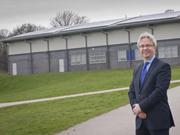Bilborough goes solar

One of the country’s largest solar power systems has been installed at a sixth form college in the Midlands.
Bilborough College in Nottingham has had more than four hundred solar panels fitted on the roof of a sports hall in the college grounds. It is estimated that the system will be worth at least £18,000 a year to the college in income and savings on energy bills.
Under the government-backed feed in tariff scheme, the college is paid for all of the electricity the panels produce. The 100 kilowatt system has cost around £200,000 and will provide around eight per cent of the college’s annual electricity. It expects to use most of the power generated by the panels to meet its own energy demands. Any excess is exported back to the grid, attracting a further payment.
The college is also planning to use the new system as a learning tool to help students covering environmental topics.
Chris Bradford, principal at Bilborough, said the project was a statement that the college wanted to play its part in cutting carbon emissions.
“We deal in young people’s futures so the environmental concerns were one of the things that drove us,” said Bradford.
“But it also makes a lot of sense financially and we wanted to take advantage of that and plan for the future. In the end it was a very easy decision to make.”
The system was installed by EvoEnergy, the country’s largest solar power company and the Renewable Energy Association’s Installer of the Year.
Gary Sucharewycz, commercial manager for EvoEnergy, said: “We’re delighted that Bilborough has taken such a forward thinking view. Colleges are ideal places for solar power – they usually have the roof space for a large-scale installation and the panels are producing electricity during the day when the college has its highest demand. Generating your own, green electricity is a very strong environmental statement to make.”
Bilborough College is the only sixth form college in Nottinghamshire. It has 1950 students studying AS, A Levels and the IB. These include around 100 international students from mainland China, Hong Kong and Vietnam.
The panels were fitted in less than a week, despite high winds and the fact that the installation team agreed to stop work to allow exams to go ahead in the sports hall.
Project manager James Sutton explained: “It’s a large steel roof, but it didn’t pose any real technical difficulties. We could get good access to the building and even though we had to break off for exams below us, it all went smoothly. I think the finished job looks fantastic, it’s a curved roof so the panels are really spectacular.”
The college intends to use the installation as a learning tool for students studying the environment.
Bradford said: “We plan to build on what we already have in subjects like Geography. Our International Baccalaureate Diploma has large elements linked into environmental studies. This allows students to come and see the electricity actually being produced. It gives teachers and students something very tangible to refer to and to work with.”
The college could be paid even more for the electricity the panels generate if the government loses a legal battle currently being fought with the solar power industry.
In December the government halved payments for generating green electricity, but solar power companies protested and the high court ruled that the move was illegal.
The government is appealing against the decision. If it loses, installations like the one at Bilborough which were installed after December could qualify for the higher payments.
Bradford continued: “We have based our calculations on the lower tariff and were happy that it still made good financial sense. If anything, the return of £18,000 a year is a conservative calculation. If fuel prices continue to rise we will be saving even more.
“But if the industry wins the legal action and we get paid an even higher rate, then that’s an extra bonus.”






Responses